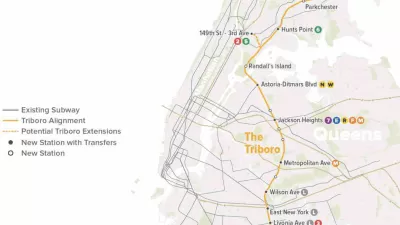The Brooklyn Development Center will close Dec. 31. The closure of the state facility is part of a long term goal of deinstitutionalizing the developmentally disabled and integrating them in the community in group homes.
The Brooklyn Developmental Center, a sprawling, state-run center in the East New York neighborhood of Brooklyn that "housed 614 residents in 1984, is down to 58 spread across five buildings on a 35-acre campus," writes Liz Robbins of The New York Times.
It's closure, along with other centers in Queens, Broome County and Schenectady County comes from the state agency that operates it, the Office of People with Developmental Disabilities (OPWDD), and is part of an effort to "streamline operations while moving patients from institutions to community-based settings," according to the Queens Chronicle.
"It is part of the state’s long-planned process of deinstitutionalization, which follows a national trend since the 1980s that has been lauded by advocates and officials, who say that less-restrictive care and community living are more humane for people with intellectual and developmental disabilities," writes Robbins. OPWDD "operates more than 1,000 group homes."
The new model is also substantially less expensive. In New York, in 2012, services at public institutions cost more than three times as much per person as services provided to adults living in group homes.
However, that's not the main topic of the article, who is a 50-year-old adult "with profound autism and self-injurious behavior who does not speak." He has lived at the center since he was fourteen. He has developed routines that have become his "refuge (that) will abruptly end", if the state has its way, before the end of the year. His parents, though, are fighting to stop the closure.
Robbins provides great insight into the past and current life of this one disabled adult; how he "is calmed by taking walks (and) has an aide with him 24 hours a day," and how his parents have adapted to having their son live there.
There is some irony in their fight to keep the center open, though, as the father had successfully sued it "for negligence, and which has had compliance issues with the State Health Department," writes Robbins. However, he "does not trust that the alternative will be safer."
Driving the closures in New York and nationwide "is a 1999 United States Supreme Court case, known as the Olmstead decision, which made it unlawful to restrict people in institutions and required that states provide opportunities for community living," writes Robbins. "Now, 12 states and the District of Columbia have completely eliminated large state-operated institutions."
It is the families whose members know no other way of life who have the toughest time with the change.
One example of an innovative group home in Sonoma, Calif. incorporating architecture meant to improve the residents' environment was posted here in 2013.
FULL STORY: For Special-Care Residents, New York State Policy Means Leaving Home

Planetizen Federal Action Tracker
A weekly monitor of how Trump’s orders and actions are impacting planners and planning in America.

Congressman Proposes Bill to Rename DC Metro “Trump Train”
The Make Autorail Great Again Act would withhold federal funding to the system until the Washington Metropolitan Area Transit Authority (WMATA), rebrands as the Washington Metropolitan Authority for Greater Access (WMAGA).

The Simple Legislative Tool Transforming Vacant Downtowns
In California, Michigan and Georgia, an easy win is bringing dollars — and delight — back to city centers.

The States Losing Rural Delivery Rooms at an Alarming Pace
In some states, as few as 9% of rural hospitals still deliver babies. As a result, rising pre-term births, no adequate pre-term care and "harrowing" close calls are a growing reality.

The Small South Asian Republic Going all in on EVs
Thanks to one simple policy change less than five years ago, 65% of new cars in this Himalayan country are now electric.

DC Backpedals on Bike Lane Protection, Swaps Barriers for Paint
Citing aesthetic concerns, the city is removing the concrete barriers and flexposts that once separated Arizona Avenue cyclists from motor vehicles.
Urban Design for Planners 1: Software Tools
This six-course series explores essential urban design concepts using open source software and equips planners with the tools they need to participate fully in the urban design process.
Planning for Universal Design
Learn the tools for implementing Universal Design in planning regulations.
Smith Gee Studio
City of Charlotte
City of Camden Redevelopment Agency
City of Astoria
Transportation Research & Education Center (TREC) at Portland State University
US High Speed Rail Association
City of Camden Redevelopment Agency
Municipality of Princeton (NJ)





























